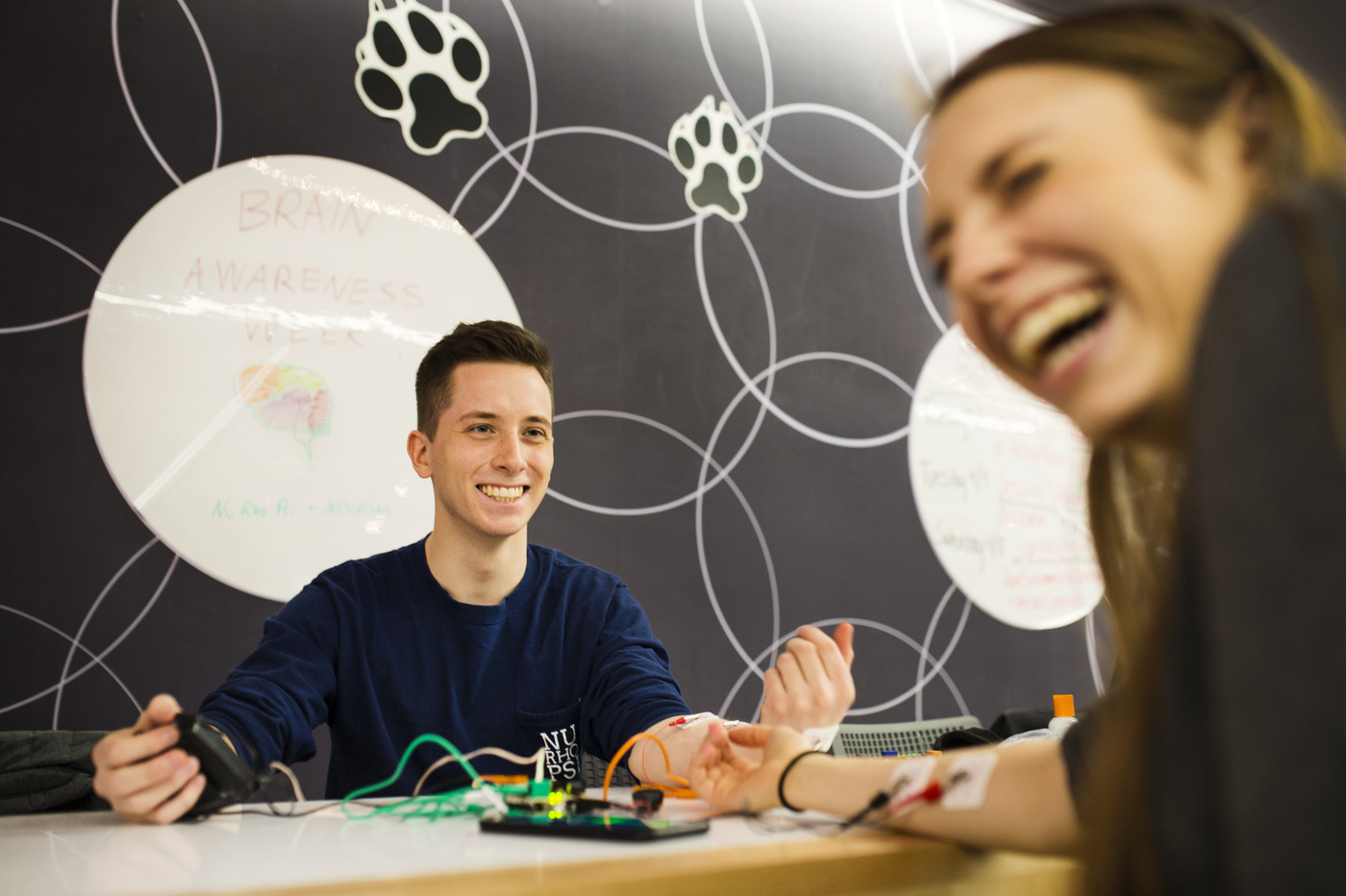by Thea Singer
Can disposable diapers help us understand a new technology that could reveal how the brain generates thoughts, feelings, behavior, and sensations?
The answer is yes, according to neuroengineer Edward Boyden, who on Wednesday night will deliver the keynote address for Northeastern’s Brain Awareness Week 2017. The weeklong program features five days of talks and interactive displays on the importance of neuroscience research and support. The Northeastern Undergraduate Researchers of Neuroscience, a student organization also known as NEURONS, is hosting Brain Awareness Week.
“Brain Awareness Week was launched by the Dana Foundation, a philanthropic organization, as a global campaign to highlight innovation and the benefits of brain research,” says Fae Kayarian, S’19, a behavioral neuroscience major and vice-president of NEURONS. “Ed Boyden is all about creating new neuroscience methods. He likes to push boundaries. His research really resonates with what we wanted this week to represent.”
Boyden, professor of biological engineering and brain and cognitive sciences at the Massachusetts Institute of Technology, develops novel optical tools to enable the observation, analysis, and repair of complex biological systems such as the brain.
One such tool is “expansion microscopy,” which enlarges physical brain specimens using polymers and water, similar to the way baby diapers use embedded polymers to swell when they get wet. The brain specimen gets so large, Boyden explains in a 2016 TEDTalk, that with high-powered imaging “you can peer inside and see all the tiny building blocks, the biomolecules, how they’re organized in three dimensions—the structure, the ground truth structure of the brain, if you will.”
Another of Boyden’s biological technologies, called “optogenics,” aims to pinpoint treatment targets for disorders such as epilepsy, and Alzheimer’s and Parkinson’s disease.
Neuroscience for all
Billed as “a celebration of neuroscience, advocacy, and innovation,” Brain Awareness Week features two additional talks. On Thursday, Northeastern’s Eugene Tunik, associate professor, will discuss “Real Rehab in Virtual Worlds: Using VR and Robotics to Map the Brain After a Stroke.” On Monday, MIT doctoral candidate Anna Wexler explored “Do-It-Yourself Brain Stimulation: Looking to the Past to Understand the Future.”
Participatory activities include experiments from Backyard Brains, a Michigan-based company that provides toolkits for exploring neuroscience principles, and a fundraiser in support of research for Alzheimer’s disease that includes a raffle with a prize of an original painting by Kayarian’s mother, artist Kari Bivona. Both activities took place on Tuesday and will repeat on Friday.
“Our aim is to provide a program that will most benefit people on campus based on work being conducted at the frontiers of neuroscience,” says Kayarian, who is currently on co-op at the Berenson-Allen Center for Noninvasive Brain Stimulation at Beth Israel Deaconess Medical Center, in Boston. “The activities are designed to bridge the gap between the NEURONS club and the university community. We want everyone to be excited about neuroscience.”
From a table at Campus Crossroads run by NEURONS with the help of the Northeastern chapter of Nu Rho Psi and other campus groups, visitors will have the opportunity to experience the role electricity plays in stimulating the nervous and muscle systems via the “dancing leg” of a cockroach hooked up to a mobile phone, among other hands-on exercises.
Given the mission of NEURONS to bring neuroscience to everyone, the club boasts an eclectic membership with students majoring in diverse fields, including business, computer science, engineering, finance, architecture, and nursing. “It’s a huge melting pot of majors,” says Kayarian. “Everyone is interested in neuroscience, but what makes the club special is that we approach the field from many different perspectives.”
For a complete schedule of Brain Awareness Week events, visit https://cos.northeastern.edu//bns/student-groups/neurons-club/brain-awareness-week-2017/.
Originally published in news@Northeastern on March 29, 2017.

